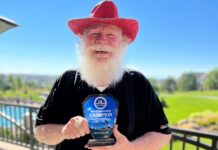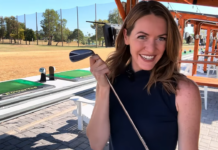Meet GolfTEC Nyberg Wood Certified Personal Coach Brad Hunter, our January Coach of the Month!
Did you know GolfTEC is the largest single employer of golf professionals in the world, with hundreds of PGA Professionals teaching daily in our Centers? These dedicated Coaches work diligently to help people play better golf and grow the game, so each month we’re calling attention to their outstanding efforts right here on the Scramble by featuring the GolfTEC Coach of the Month!

To get started, we’d like to introduce you to Brad Hunter, a Certified Personal Coach at GolfTEC Nyberg Wood who is a PGA Member and graduate of the Golf Academy of America. Here’s what one of Brad’s students had to say about his time working with together:
“Who knew short game was so important. For years I have wanted to drop my average score from 90 down to a 79 but I was so focused on the full swing mechanics. In a year of taking lessons with Brad Hunter he showed me how important short game is to scoring. I am now shooting scores in the high 70’s and low 80’s on a consistent basis. This was only possible because Mr. Hunter made me work on wedge play and putting, it was not negotiable. He always says putting is the most overlooked part of golf instruction, and after the success I have had with short game I can see why!” – Tim L.
We also asked Brad about his experience and why he loves helping people play better golf:
What were your driving factors to become a golf instructor?
When I was 14 years old I had just started on my quest to become a golfer. I didn’t know a wedge from a 7 iron. My hometown golf instructor, Mark Payne, saw me struggling on the range and came over to help. In my first official lesson I remember the feeling of crisp solid contact and couldn’t believe how much he had helped. Coming from a family of schoolteachers I’ve always had a passion for teaching. In college I knew I couldn’t hack it as a schoolteacher, but I started giving friends and acquaintances golf lessons and felt differently about golf. I remembered back to the day Mark helped me and I always wanted to give back in the same way. That’s when I knew I wanted to be a full-time golf instructor.
What is the most important thing you’ve learned as an instructor?
It’s to not to sugarcoat anything. Time spent telling people what they want to hear doesn’t help anyone solve their issues. I hold my students accountable for their practice routines, and I’m always honest about how much work it’ll take to accomplish their goals. Finding ways to relay this accountability is key in order to maintain a good relationship with your students, and those who really want to improve appreciate being held accountable for their routines.

Do you have any single moment as an instructor that stands out above the rest?
My most memorable moment was watching one of my students break his personal low round by seven strokes while playing beside me in a pro-am. His career low was an 86, and even under the pressure of tournament golf he managed to shoot 79. I don’t think I’ve ever seen a grown man so happy. He had tried for 25 years to break 80, and we did it three months into our year-long plan together.
 What is one of your favorite student improvement stories?
What is one of your favorite student improvement stories?
One of my biggest success stories is taking a student from a 19.4 handicap to 6.5 in ONE year of instruction. Getting students to buy into the importance of short game is one of the biggest keys to rapid improvement like this, and for this student, it was definitely the biggest key to his success.
What is the advantage you’ve found teaching at GolfTEC compared to anywhere else?
There’s nowhere I’ve taught that even comes close to having the retention tools that we have at GolfTEC. This is so important in the learning process, because so many golfers have struggled with the same issue for years. This means we have a ton of undesirable patterns to rebuild to get lasting results. In the bay we can show students factual data to help them understand why we need to change certain aspects of their swing. The in-bay practice is also one of the biggest keys to student success, because it provides an easy-to-see, confidence-inspiring environment to know they’re practicing correctly.











